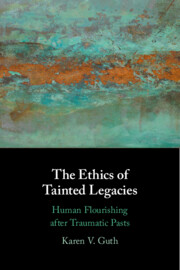Book contents
- The Ethics of Tainted Legacies
- The Ethics of Tainted Legacies
- Copyright page
- Contents
- Acknowledgments
- Introduction
- 1 Tainted Legacies
- 2 Common Responses to Tainted Legacies
- 3 “Biblical Birthright” and the #MeToo Movement
- 4 Heritage and Hate
- 5 Inheriting America’s Original Sin
- 6 Individual and Institutional Responses to John Howard Yoder’s Tainted Legacy
- Conclusion
- Bibliography
- Index
3 - “Biblical Birthright” and the #MeToo Movement
Feminist and Womanist Biblical Scholarship on How to Read Cultural Texts of Terror
Published online by Cambridge University Press: 07 July 2022
- The Ethics of Tainted Legacies
- The Ethics of Tainted Legacies
- Copyright page
- Contents
- Acknowledgments
- Introduction
- 1 Tainted Legacies
- 2 Common Responses to Tainted Legacies
- 3 “Biblical Birthright” and the #MeToo Movement
- 4 Heritage and Hate
- 5 Inheriting America’s Original Sin
- 6 Individual and Institutional Responses to John Howard Yoder’s Tainted Legacy
- Conclusion
- Bibliography
- Index
Summary
On September 25, 2018, actor Bill Cosby, once known as “America’s Dad,” was sentenced to three to ten years in prison for three counts of aggravated indecent assault against Andrea Constand.1 Although the Pennsylvania Supreme Court has since overturned his conviction, citing a due process violation, the original trial followed decades of allegations from more than sixty women that Cosby had sexually assaulted them, often with use of methaqualone – acts that Cosby himself had admitted in a previous civil case.2 But Cosby’s fall from grace is only one recent example of “Great Artists Who Have Done Terrible Things.”3
- Type
- Chapter
- Information
- The Ethics of Tainted LegaciesHuman Flourishing after Traumatic Pasts, pp. 88 - 123Publisher: Cambridge University PressPrint publication year: 2022

